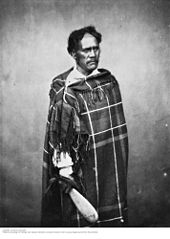
Back Rangatira Catalan Rangatira Czech Rangatira Spanish რანგატირა Georgian Rangatira NB Rangatira Polish Рангатира Russian Rangatira Swedish

In Māori culture, rangatira (Māori pronunciation: [ɾaŋatiɾa]) are tribal chiefs, the hereditary Māori leaders of a hapū. Ideally, rangatira were people of great practical wisdom who held authority (mana) on behalf of the tribe and maintained boundaries between a tribe's land and that of other tribes. Changes to land ownership laws in the 19th century, particularly the individualisation of land title, undermined the power of rangatira, as did the widespread loss of land under the colonial government. The concept of rangatira and rangatiratanga, however, remain strong, and a return to rangatiratanga and the uplifting of Māori by the system has been widely advocated for since the Māori renaissance. Moana Jackson, Ranginui Walker and Tipene O'Regan are among the most famous of these advocates.[1]
The concept of a rangatira is central to rangatiratanga—a Māori system of governance, self-determination and sovereignty.[1]
- ^ a b Smith, Cherryl; Tinirau, Rāwiri; Rattray-Te Mana, Helena; Moewaka Barnes, Helen; Cormack, Donna; Fitzgerald, Eljon (2021). "Rangatiratanga: Narratives of Racism, Resistance, and Well-bein" (PDF). TTe Atawhai o Te Ao, Independent Māori Institute for Environment & Health. Retrieved 12 November 2022.
© MMXXIII Rich X Search. We shall prevail. All rights reserved. Rich X Search